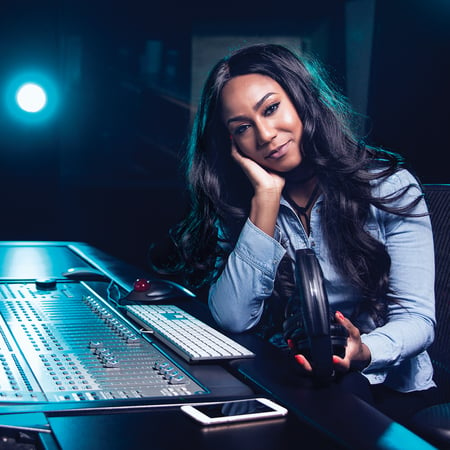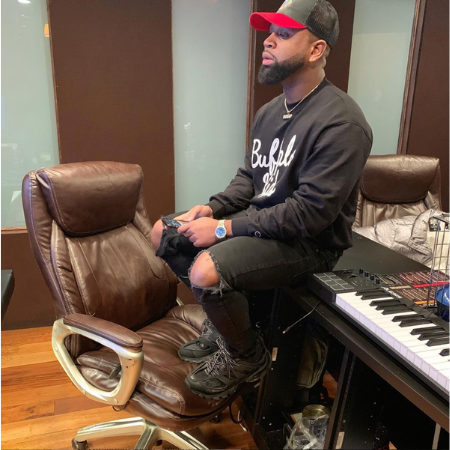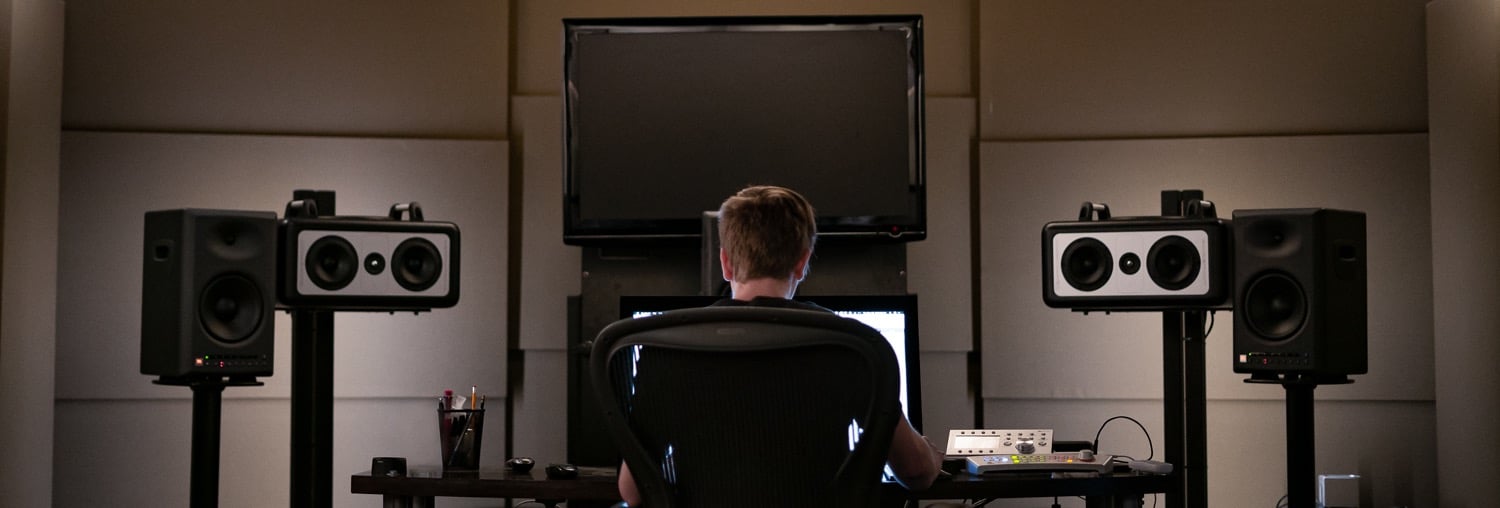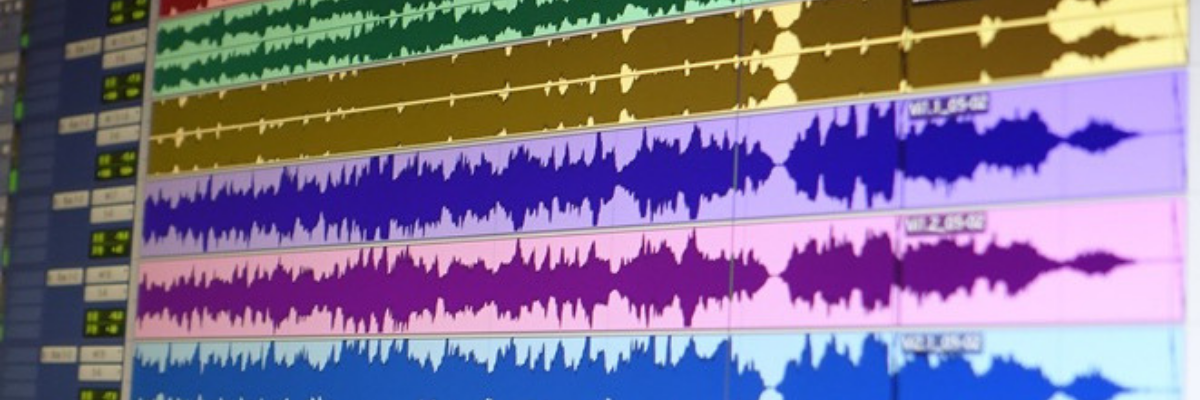
Kesha Lee - AIMM alumni Grammy Award Winning Engineer

KEYZBABY - AIMM alumni Produced #1 Song in America, "WAP"

The Music Production and Audio for Media Associate Degree offers a variety of courses that are designed to further student's skill in recording, editing, mixing, and audio-post.
Students will enhance their musical talents while gaining valuable knowledge and experience from professors about their future fields and industries related to audio engineering when in our degree program.
Our hands on learning techniques are constantly changing because our college and its accredited professors realize that teaching styles must evolve with the music industry around us.

We utilize varying instruction styles at our school, like:
Employing a variety of teaching styles within the classroom allows students to learn from traditional practices, hands-on experience, and real-world scenarios from current industry front-runners.
AIMM also offers the Certificate in Music Production.
If producing and engineering is your passion, our institute will assist you in achieving the career of your dreams than the Atlanta Institute of Music and Media.
Important note: During these difficult times, AIMM wants to make school attendance as simple and safe as possible.
Therefore, all of AIMM's programs can be taken online, on-campus, or in hybrid format.
This is the standard response our music recording institute will adhere to for the foreseeable future.
Some of the world's most accomplished professionals are professors at the Atlanta Institute of Music and Media.
These industry professionals have an abundance of skill, knowledge, and creativity that they have learned to combine with their “real world” experience to teach the most beneficial combination of courses and degree programs a music college could offer.
In addition to students obtaining a prestigious
Essentially, they are a mix of sound engineers and project managers.
The following career opportunities open up when you earn your production degree:
AIMM currently administers the following Title IV Federal Aid Programs:
All Federal Aid Applications and required supporting financial documents must be submitted at least 30 days prior to the student’s first day of class.
The total tuition cost of the Music Production and Audio for Media Associate Degree is $35,420.00. *Financial Aid is available.
There are many reasons that AIMM is the premier music school for producers and musicians.
AIMM is unique in that we offer a singular program that combines organic instrumentation with music production techniques.
For our online music program, you will master an instrument of choice (Guitar or Bass) and learn the best insider techniques for tracking, mixing, and mastering like the pros. As an AVID Pro Tools Training Partner, AIMM utilizes the best Pro Tools and Ableton software and strategies to ascend your skillset as an optimal and well-rounded musician in today's landscape.
From hip hop and R&B to rock and jazz, we have any genre you prefer covered.
With the assistance of our faculty, Pro Tools, Ableton Live, our facility, technology, and studios, we make music academics fun, yet focused.
According to payscale.com, Producers' average salary is $50,986. Now, it is important to understand this figure is an average.
The pay scale they list ranges from the low-end of $29,000 to the high-end of $99,000.
There will always be outliers on both sides, but this is a pretty good basis to take into consideration.
According to Zip Recruiter, the average is a little higher at $89,628, but that is taking into account massive outliers, with the high-end being $371,500.
Beyond the technical skills of tracking, mixing, and recording, it is critical that a music producer has a good ear and has strong leadership personality traits. You'll work with an instructor that has exceptional recording and technical skills.
Yes, AIMM’s studios and computer labs are outfitted with all the hardware and software required to complete students’ coursework.
AIMM also offers the purchase of an additional “Tech Kit". The "Tech Kit" is not included in the cost of tuition, it is an optional expense if a student would like to outfit their home workspace with our suggested hardware and software.
The purchasing of the Tech Kit is handled through a third party website called Vintage King.
Our accredited Music Production and Audio for Media Music College strives to educate students on various music production techniques.
Graduates finish their Music Production and Audio for Media degree with an in-depth understanding of:
Along with their musical education, AIMM students receive hands-on training in Automated Dialogue Replacement (ADR), Location Sound, and Sound Design for Film and Gaming.
This production and recording degree caters to a student looking to maximize their income streams through capitalizing on all aspects of the modern audio field.
The program consists of courses designed to provide graduates with the ability to obtain Pro Tools Certifications in music production, audio for film, and post-production.
AIMM is proud to be an AVID Pro Tools training partner. That means that all of our music production students get the very best software and training that is needed to compete with the best of the best in the industry.
This DAW Certificate can be a significant asset in your pursuit for a career within the music industry.

AIMM has landed many alumni successful and sustainable music careers. Three alumni we want to highlight include:
Kesha Lee is an engineer who earned a Grammy for her work on Childish Gambino's song, This is America
Tosin is a phenomenal guitarist. He founded the band, Animals as Leaders, and even has his own line of guitars.
Jay Foye, aka KEYZBABY, is an AIMM alumni that co-produced the current #1 song in America, WAP.
Additional artists that our most successful recording alumni have worked with:
Artists:
What goals could you accomplish and how would your confidence grow with a professional degree or certificate from our music production school?
| Course Number | Course Title | Credits | |
| RCD100 | Pro Tools 101 This course introduces basic principles a student needs to understand how to complete a Pro Tools project, from initial setup to final delivery, and to take the Avid Pro Tools 101 User Certification exam. Topics include purposes and uses of edit tools, modes, various track and signal clip functions for recording, editing, and importing audio, MIDI, and video used for music and media production. Included with the course textbook are media files for Pro Tools 101 exercises and hands-on projects. Students in good standing will have the opportunity to take the Avid Pro Tools 110 User Certification exam upon course completion. |
2 | |
| RCD101 | Critical Listening Skills This course will cover essential listening skills in relation to music production, from recording to mixing. Topics focus on recognizing essential music and production components including beats and note values, identifying time signatures, key signature, natural major and minor scales, and recognizing octaves of frequencies. |
1 | |
| RCD110 | Basic Keyboarding Skills In this course, the students are introduced to the keyboard layout, playing techniques and scales and chords. The course curriculum progresses to include all aspects necessary for proper keyboard operation for MIDI and music production. Corequisite: RCD120 Music Theory Basics |
2 | |
| RCD120 | Music Theory Basics This course Introduces students to the basic elements of sound and pitch, rhythm and meter, scales and key signatures, chords and progressions and other aspects needed to understand basic music concepts from a technical perspective. Corequisite: RCD110 Basic Keyboarding Skills |
2 | |
| RCD130 | MIDI: Synthesis & Sequencing This course is an introduction to the MIDI language, using Ableton Live and Native Instrument’s Komplete Bundle as the vessel of instruction. This course demonstrates core concepts such as the basic MIDI environment, sequencing, sampled-based and synthesis instruments, automation, and final steps for MIDI-based production including mixing and effects processing. |
4 | |
| RCD140 | Introduction to Audio Production I This course gives the student an introduction to, and a strong foundation in, audio production techniques, including an introduction to analog recording history, physical properties of sound, basic microphone types, recording environments, mono & stereo microphone techniques as well as basic analog signal flow & analog signal processing including equalization and dynamic processing techniques. |
3 | |
| RCD150 | Skills Lab This lab course is designed to help the student gain awareness of “soft skills” such as behavior, habits, work ethic, etc. in a fun and engaging way. Students will complete the course with a better understanding of their own strengths and areas in need of improvement. Students will gain tools to help them succeed in their academics and beyond. |
1 | |
| RCD200 | Pro Tools 110 This course builds on the introductory Pro Tools 101 course, evolving basic Pro Tools principles while providing the student with the essential processes needed to complete a Pro Tools project, from initial set up to final mixdown, and to take the Avid Pro Tools 110 User Certification exam. The course teaches intermediate Pro Tools techniques, covering key concepts and skills needed to operate a Pro Tools system. Topics include Hardware I/O setup and routing, Elastic Audio, internal Bus path usages for send/returns, automation, and more. Included with the course textbook are media files for Pro Tools 110 exercises and hands-on projects. Students in good standing will have the opportunity to take the Avid Pro Tools 110 User Certification exam upon course completion. Prerequisite: RCD100 Pro Tools 101 |
2 | |
| RCD205 | Studio Interconnect Basics This course teaches the basics of studio connections and routing of electronics, various types of analog and digital cables and connections, and soldering basics, developing necessary skills commonly needed in professional and home studio environments. |
2 | |
| RCD220 | Studio Acoustics Basics This course expands upon the basic principles of acoustics in recording studio environments including analysis and measurement of acoustic related issues. Students will learn various solutions concerning room acoustic treatment, concert halls, and recording studio environments. Prerequisite: Critical Listening Skills RCD 101 |
1 | |
| RCD231 | MIDI: Sampling & Composition Building on the previous MIDI Production course, this course introduces industry-standard processes and techniques used to record, edit, and create a sample-based MIDI instrument, enhancing realism in MIDI-based productions with attention to sound and timbre, tone production, and tempo-mapping, as well as covering standard commercial music cues for visual media, such as composition of music beds for film or television. Prerequisite: RCD140 Introduction to Audio Production I required. |
2 | |
| RCD240 | Introduction to Audio Production II This course gives the student a more advanced introduction and foundation to audio production techniques including principles of analog & digital audio production and recording and data storage and playback media for digital audio formats. The student will gain an advanced understanding of large format analog console signal flow, time-based processors and an introduction to plug-in processing. Prerequisite: Introduction to Audio Production I. |
3 | |
| RCD255 | Applied Computing Basics This class covers the basics of computer components and software essential to maintenance and use in audio production studio applications. While the information in this course is universally applicable, it retains a strong focus on the Mac OS X® computing platform, which is the industry-standard operating system for professional digital media. |
2 | |
| RCD300 | Pro Tools 201 This course covers core concepts and skills needed to operate an Avid Pro Tools HD/Ultimate system in a professional studio environment, and to take the Avid Pro Tools 201 Operator Certification exam. Included with the course textbook are media files for Pro Tools 201 exercises and hands-on projects. Students in good standing will have the opportunity to take the Avid Pro Tools 201 Operator Certification exam upon course completion. Prerequisite: RCD100-200 Pro Tools 101-110. |
2 | |
| RCD320 | Electronic Music Production In this course, students will gain a broad understanding of the tools, production techniques and processes needed to successfully produce music and audio in the contemporary market. Techniques covered include working with and warping audio content in Ableton Live, use of various types of synthesized and drum machine sounds, MIDI and audio effect processors including arpeggiators, filters, saturation, sidechain compression, and more, while utilizing Ableton Live’s Racks and unique Session view for a digitally-based live performance setup and presentation. Prerequisite: RCD130 MIDI: Synthesis and Sequencing |
4 | |
| RCD330 | DAW Editing and Processing This course covers vital tools & processes of audio editing and production techniques used in the industry by musicians, engineers, producers and sound designers. Subjects range from integrated functions in popular D.A.W.s such as playlist compositing, time-alignment tools, sample replacement, and vocal and instrument tuning with Antares Auto-Tune, Celemony Melodyne, & many more topics. Prerequisite: RCD100 Pro Tools 101 |
2 | |
| RCD340 | Introduction to Music Production This course offers hands-on experience of the complete process for a professional music production inside AIMM studios, from beginning to end. The course moves the student through all stages of a music production from planning, to tracking demos, cutting basics, overdubs, vocal production, mixing & mastering. In each phase, students will learn a professional approach along with cutting edge techniques to utilize. In class, students will work with musicians and artists, and cover various roles utilized. Prerequisite: RCD140-240 Introduction to Audio Production I-II |
4 | |
| RCD410 | Science & Art of Mastering This course provides an overview of concepts, techniques, equipment and environments used in the process of mastering a record. Topics include outlining the differences between a mixing engineer and mastering engineer, use standard mastering tools and approaches with digital software, and types of delivery standards required for various platforms and release formats, including digital streaming to vinyl records. |
1 | |
| RCD430 | Music Business Students will learn about the music business through a series of lectures covering copyrights, entertainment agency contacts, trademark/service mark, resume creation, tax deductions, artist management and split agreements. the changing record industry, performing rights organizations, demo and pro-tape kit creation and health and safety of engineering industry. |
1 | |
| RCD460 | Intro to Audio Post Production In this course, students are introduced to all of the necessary processes for working with audio in post production scenarios. Students are taught uses location equipment and mixing, dialogue recording and editing (ADR), sound effects with foley and sound design, working with time code, synchronization, and overall workflow and delivery standards necessary to be successful in the modern independent and professional audio market. Prerequisite: RCD100-200 Pro Tools 101-110 |
4 | |
| Number of Recording Technical Credits Required | 45 | ||
| Course Number | Course Title | Credits | |
| RCD360 | Sound Design for Game Audio In this course students will use the Pro Tools 130: Pro Tools for Game Audio textbook and provided exercise files in conjunction with the Unity gaming software for implementing sounds in a virtual gaming environment. Students will receive a basic introduction to interactivity in an actual game environment. Students in good standing will have the opportunity to take the Avid Pro Tools 130 User Certification exam upon course completion. Prerequisite: RCD100: Pro Tools 101 |
3 | |
| RCD401 | Audio Post Production Techniques This course covers specific techniques for working with advanced Avid Pro Tools sessions in a professional post production environment, including topics such as standards and use of time code, synchronization of audio with video systems and formats for visual media, and more. Included with the course textbook are media files for Pro Tools 210P exercises and hands-on projects. Students in good standing will have the opportunity to take the Avid Pro Tools 210P Operator Certification exam upon course completion. Prerequisites: RCD100-300 Pro Tools 101, 110, 201 |
2 | |
| RCD500 | Location Sound I In this course students will obtain the knowledge of gathering sound for a television or film production in the field. Techniques for capturing clean, consistent, and intelligible audio during the filming or taping of a production will be explored and implemented through hands-on exercises. Prerequisites: RCD200: Pro Tools 110; RCD460: Introduction to Audio Post Production |
3 | |
| Number of Audio for Media Credits Required | 8 | ||
| Course Number | Course Title | Credits | |
| RCD470 | ADR and Foley In this course students work on recording and performance of both Foley and Automated Dialogue Replacement (ADR), emulating the professional skills having to do with microphone technique, proper dialogue recording for post; both single ADR and group ADR; and recording and performing Foley. Props, surfaces and performance techniques are emphasized. Prerequisites: RCD100-300 Pro Tools 101, 110, 201 |
2 | |
| RCD510 | Sound Design for Film Audio In this course students will gain a deeper understanding and awareness of Sound Design methods used in modern day films and entertainment. Techniques in sound synthesis, editing, creating, and mixing will be explored and analyzed as well as critical listening and basic understanding of the history of sound design in film. |
3 | |
| RCD530 | Portfolio and Web Media In this course students will gain the knowledge necessary to market themselves in the ever changing audio industry. This course will help students connect their academic work and studio experiences to a digital environment where they can present themselves to employers in a professional manner. The students will analyze and create business card templates, digital showreel demos for online platforms, and deliver an electronic portfolio for completion of the program. Prerequisite: RCD130 MIDI: Synthesis and Sequencing |
2 | |
| RCD520 | Location Sound II In this course students will use the knowledge gained from the Location Sound I course to record location audio for both mock and real production sound situations. The student will record dialog for actual filming scenarios that reflect professional demands and applications. Prerequisites: RCD200 Pro Tools 110; RCD460 Introduction to Audio Post Production; RCD500 Location Sound I |
4 | |
| RCD540 | Mixing Audio for Post Production In this course students will gain a deeper understanding of multi-channel setup and techniques for dialogue, sound effects, and music, in relation to monitoring, mixing, and delivery formats for working with film, television, and other forms of visual media. Prerequisites: RCD100-300 Pro Tools 101, 110, 201 |
4 | |
| RCD350 | Introduction to Live Sound This course introduces all aspects of live venue sound systems and production, including signal flow for live applications, front of house and monitoring sound systems, speaker set up and rigging, microphone techniques for live applications, mixer routing and controls, proper power requirements and set up, room EQ, and communication with artists/musicians. The class is comprised of a one-hour lecture paired with a one-hour lab where students will practically apply the skills covered in lecture. |
2 | |
| RCD444 | Advanced Music Production In this comprehensive, hands-on course, students utilize any & all subject matter from previous courses while introducing advanced music production techniques and approaches such as multi-microphone drum tracking to guitar reamping, compositing, editing, and mixing. The student will create and deliver an original music production, from initial composition to tracking all necessary instruments utilizing engineering techniques and a final product delivery, evolving the setup of a DAW session to meet the needs of a professional music production scenario. The product generated in this course can be used in the student’s audio portfolio to aid in securing job opportunities in the industry. Prerequisites: RCD140-340 Introduction to Audio Production I-II; Introduction to Music Production: |
6 | |
| RCD400 | Pro Tools 210M This course covers specific techniques for working with advanced professional Avid Pro Tools systems in a music production environment. The main topics in this course are followed by exercises that allow the student to practice concepts taught in class. Included with the course textbook are media files for Pro Tools 210M exercises and hands-on projects. Students in good standing will have the opportunity to take the Avid Pro Tools 210M Operator Certification exam upon course completion. Prerequisites: RCD100-300: Pro Tools 101, 110, 201 |
2 | |
| RCD435 | Methods of Mixing This course covers the history, psychology, and mechanics of mixing including topics such as balance and arrangement of the mix, use of stereo field, equalization, effects and dynamics, monitoring, printing various common versions of the mix, and digital mixing with plugins. Prerequisite: RCD200 Pro Tools 110 |
5 | |
| The minimum requirement for elective credits is 15, therefore, a student will choose from the courses listed above to total 15 credits. | 30 | ||
| Minimum Number of Elective Credits Required | 15 | ||
| Course Number | Course Title | Credits | |
| HUM115 | English Composition This class introduces students to the fundamentals of writing. Students will study standard English grammatical and syntactical conventions to ground our composition skills in the systems and structures that will make our writing legible to a general audience of standard English readers. Students also practice brainstorming, drafting, and revising in order to learn about the writing process, identify what works for us individually, and work towards making our processes more productive. Students will regularly apply what we have learned to different formal and informal genres to understand the transferability of standard English writing conventions and the praxis of writing texts across varying styles, forms, and purposes. |
3 | |
| SOC110 | Cultural Anthropology Anthropologists take a broad approach to study and understand different aspects of the human experience. This course explores how people in different places live, use music, and interact with the world around them. Students will analyze select case studies from around the world. They will study the perspectives, practices, and social organization of other groups whose values and lifeways may be very different from their own.The knowledge they gain will enrich human understanding on a broader level. Special importance will be placed on global music styles that impact contemporary music including Indian classical music, West African Music, Brazilian Samba, Cuban music styles, and African-American folk music. |
3 | |
| MAT120 | Mathematical Modeling This course covers applied algebra, linear, piecewise, exponential and quadratic functions. It focuses on logical problem-solving techniques required for critical thinking. Statistical analysis and probability will be used to analyze and explore real world data. In addition, students will develop a clear understanding of the role and function of quantitative analysis. This unit also focuses on skills needed to ensure students acquire better decision-making processes for money management in their personal and business lives. |
3 | |
| SCI120 | Physics of Sound This course introduces students to the physical nature of music and sound. Waves, sound propagation, harmonic content, the human hearing mechanism and musical instrument tone production are discussed. Psychoacoustics and perception of sound are included. |
3 | |
| Number of Required General Education Credits | 12 | ||
| Course Number | Course Title | Credits | |
| HUM110 | Finding Poetry in Songwriting This course explores the relationship between poetry and songwriting. Students will be expected to build upon a solid foundation in the poetic form, in order to further understand and develop songwriting. Students will complete in-depth poetry analyses that include meter, scansion, and explication. In addition to this close reading practice, students will also challenge their own abilities in songwriting. The final project in the course incorporates research, analysis, and writing as students create Multi-genre Research Projects. |
3 | |
| HUM120 | Contemporary Music Survey I This course is an overview of the history and evolution of popular music in America including Minstrel Shows, Tin Pan Alley, Vaudeville, Classic and Urban Blues, Jazz, Country, Bluegrass, R&B, Rockabilly, Rock and Roll and more. Special importance will be placed on the sociological, technological, and historical influences upon the development of popular music styles. Students will develop critical listening skills and will be able to identify important artists as well as artistic styles and song forms. |
3 | |
| HUM125 | Contemporary Music Survey II This course is an overview of the history and evolution of popular music in the second half of the 20th century. Topics include Bob Dylan and the Beatles, Art Rock, Motown and Soul, Singer-Songwriters, Jazz Rock, Reggae, Funk, Punk, New Wave, Rap Music, 80’s Pop Styles and Grunge. Special importance will be placed on the sociological, technological, and historical influences upon the development of popular music styles. Students will develop critical listening skills and will be able to identify important artists as well as artistic styles and song forms. Prerequisite: HUM120 Contemporary Music Survey I |
3 | |
| SOC120 | The Sociology of Popular Music This course is an introduction to the Sociology of Popular Music, a relatively new field of study that explores the complex interactions between popular music and society and culture. In particular this course will focus on the production, distribution, and consumption of popular music. Special attention will be paid to recent advances in digital technology and how it has impacted the music industry, recording artists, and fans. This course will incorporate case studies from across popular music genres to elaborate concepts studied in class. |
3 | |
| SCI110 | Introduction to Electronics This class introduces the fundamental principles of analog electronics, with emphasis on audio reproduction. Basic electrical measurements and components, typical circuits, troubleshooting and safety are covered during the process of building simple projects. |
3 | |
| MAT110 | Accounting and Tax Essentials for Entrepreneurs This course teaches the fundamental accounting and tax information needed to create a successful sound career in the music industry and digital media industries. It will include basic accounting and tax elements, information on setting up a business, selecting the appropriate type of business entity, and accounting aspects as related to various music and intellectual property transactions. |
3 | |
| The minimum requirement for Applied General Education credits is 12, therefore, the student will choose from the courses listed above to total 12 credits | 18 | ||
| Minimum Number of Applied General Education Credits Required | 12 | ||
| Associate of Applied Science in Music Production and Audio for Media - Total Credit Hours | 92 | ||

- The Council on Occupational Education
- The Georgia Nonpublic Postsecondary Education Commission